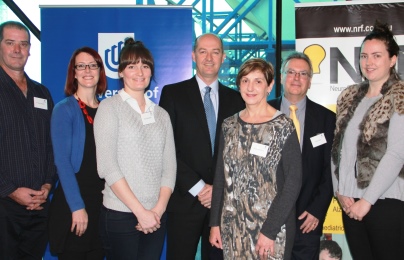21 June 2016
 New research from UniSA and SA Pathology’s Centre for Cancer Biology (CCB) could support more effective chemotherapy treatment for one of the most lethal brain cancers, Glioblastoma.
New research from UniSA and SA Pathology’s Centre for Cancer Biology (CCB) could support more effective chemotherapy treatment for one of the most lethal brain cancers, Glioblastoma.
And this week the research will receive a boost of $68,000 from the Neurosurgical Research Foundation (NRF), allowing leading brain cancer researcher, Prof Stuart Pitson, to take his work one-step closer to clinical application.
As head of CCB’s Molecular Signaling Laboratory Prof Pitson and his team examine the molecular mechanisms controlling the growth and survival of cancer cells with the goal of developing new agents to target these mechanisms for anti-cancer therapy.
Prof Pitson says Glioblastoma is one of the most aggressive forms of brain cancer and is especially resilient to treatment.
“This cancer effects people of all ages and has an extremely low survival rate – often from diagnosis to death can be as little as a few months – it is a devastating disease,” Pitson says
“Treatment is generally a combination of surgery to remove as much of the tumour as possible, followed by radiotherapy and chemotherapy and often after all of that, life is extended by just a few months.
“We have discovered that this kind of brain cancer is quite resistant to radiotherapy and chemotherapy because in Glioblastoma the metabolism of lipids is defective. We’ve found what we call a ‘survival protein’, which protects it from these treatments.
“Our research has focussed on how we can overcome this and improve the beneficial effects of the chemotherapy and radiotherapy for sufferers.
“We’ve isolated the survival protein and have discovered an agent that makes the brain cancer cells more sensitive and therefore vulnerable to the chemotherapy treatment. Our goal is to develop the agent so that it can be used with chemotherapy, maximising its attack on the tumour.”
“We are advancing this work into pre-clinical models and the results have been extremely promising and at this stage of the project we are extremely grateful for this important support from the NRF.
“Clinical trials in patients with Glioblastoma are at least four years away but this is an important advance in the treatment of a terrible cancer.”
Vice Chancellor of the University of South Australia Professor David Lloyd says the support of the NRF is vital and encouraging.
“Researchers are increasingly dependent on a range of funding sources and the role of organisations such as the NRF is significant in ensuring significant research, such as the work being done by Stuart and his team, can be driven to clinical application.
“We are grateful for this support.”
The NeuroSurgical Research Foundation (NRF) raises money for life-saving and life-changing neurosurgical research. It supports research targeted at new treatments, greater understanding, longer survival, better quality of life.
Media contact: Michèle Nardelli mobile: +61 418 823 673 email: michele.nardelli@unisa.edu.au


